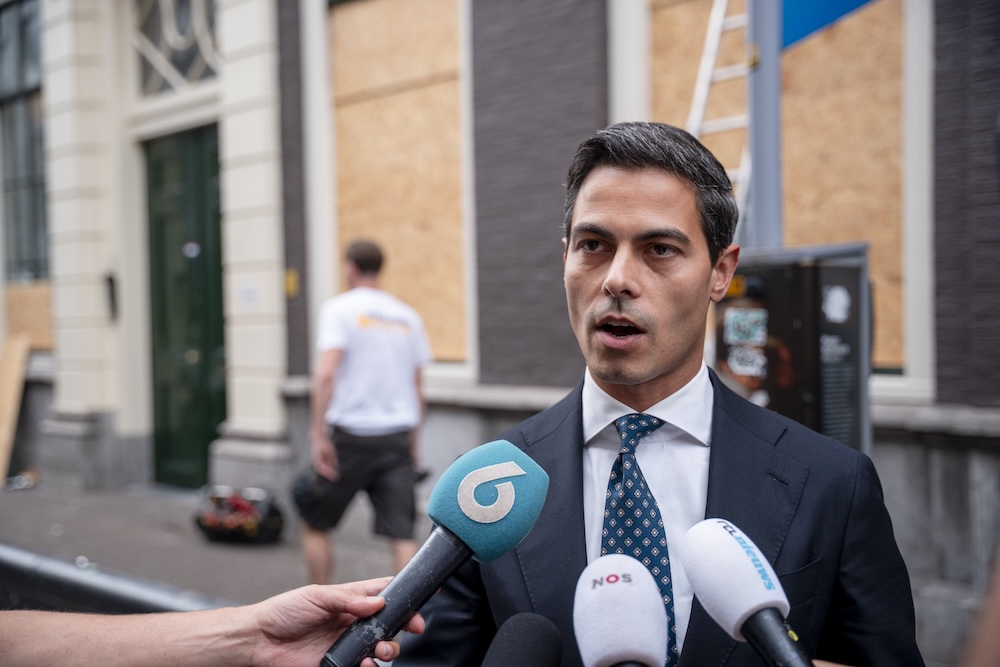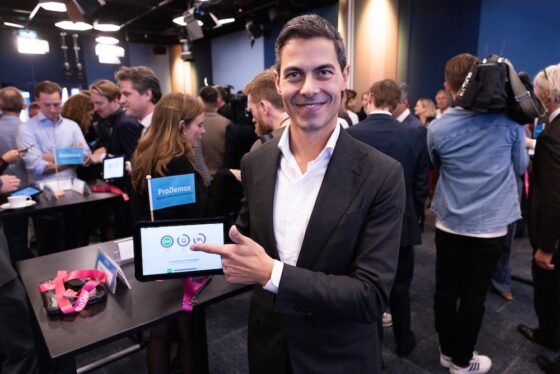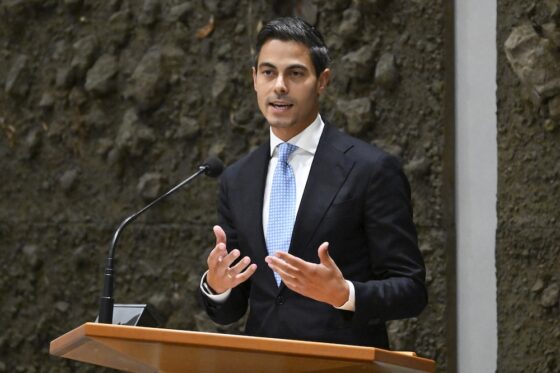“The Netherlands has stood still for 15 years,” says Rob Jetten
Gordon Darroch
The Liberal Democratic party D66 is set to make gains in the general election at the end of this month. Its leader Rob Jetten spoke to Dutch News about the hardening attitudes in politics, the housing crisis, education and immigration, and how he thinks trust in government can be brought back.
Two weeks ago Rob Jetten, the leader of D66, stood in a pile of broken glass outside the social-liberal party’s office in The Hague, beside a burned-out dumpster. Hundreds of far-right hooligans had swept through the city centre from an anti-immigration protest and converged on the parliament complex, the heart of Dutch democracy.
“Everyone condemned the outburst of violence, but it was difficult to have a debate about,” he told Dutch News in an interview. ” But what is the impact of the increasingly hard language and politics on the mood in society, and what should we do about it?“
The bigger problem, Jetten says, is that political paralysis in the Netherlands has eroded public confidence. One thing parties from left to right agree on is that the Dutch system of painstaking negotiation, the “poldermodel“, has stalled, leading to an overcrowded asylum system, a shortage of around 400,000 houses and a failure to tackle excessive nitrogen pollution that has crippled the transport, infrastructure and farming sectors.
“The Dutch government hasn’t really done any big impressive things for the last 10 to 15 years,“ Jetten says, referring to a period in which D66 was in government for almost half the time. “As long as people get the sense that their lives are standing still because they’re not making progress, it’s bound to feed those feelings of anxiety and discontent in society, and it’s always easy in that climate to exploit that anxiety.”
Jetten believes politicians have a responsibility to break the tendency of people to “live in their own bubble” rather than constantly preach to the converted. During the summer recess his staff pinpointed the places where D66 won less than 5% of the vote in the 2023 election, usually provincial towns with a strong far-right PVV presence like Emmen, Sittard, Almelo and Lelystad.
Instead of making stump speeches, Jetten talked to people in community centres, sports clubs and cafés, and listened to what they had to say.
“At first there was suspicion and a sense of, what’s this guy doing here?“ he says. “But we always ended up having a very good conversation. And what I noticed was that no matter where I was in the country, people’s concerns were broadly the same. From the harder social climate to problems in the housing market in particular. And the question: will my children be better off than me? For the first time in generations, people in the Netherlands are thinking their children won’t have a better future than they did.“
As a progressive party with high support among university graduates and young urban professionals, D66 has never been short of confidence in its leadership abilities. But that confidence took a knock at the November 2023 election, when the party lost nearly two-thirds of its 24 seats as the electorate swung hard to the right.
Its own post-election analysis concluded that the party’s message was “too didactic, too woke” – perhaps, to borrow Jetten’s words, too isolated in its own bubble. D66 also suffered from the fact that the issues on which it tends to scores best with voters, such as education, Europe and climate, were overshadowed by the relentless focus on migration that propelled Wilders’ PVV to 37 seats.
- The Dutch general election: how would you vote if you could
- Inburgering with Dutch News: the 15 biggest political parties
Current polling puts the party on course for a modest recovery from nine seats to around 12. Its manifesto this time around contains some familiar D66 policies, notably in education, where the party wants to cancel the €800 million budget cuts imposed on the sector by the current cabinet and invest in technology and innovation.
It remains one of the most progressive parties on medical-ethical issues, arguing that euthanasia and abortion should be fully decriminalised (both are currently permitted under strict conditions) and wants to introduce “better and faster“ transgender care.
Home grown green energy
But on other issues the manifesto strikes a more populist tone. The chapter on climate emphasises “affordable home-grown green energy“ above grand schemes to manage the energy transition. Europe, too, has dropped down the running order, although D66 is still a firm believer in closer co-operation on defence, asylum and digital security.
But the priority is now on ensuring “strategic independence“, both in the military and economic sense, with a European army, a doubling of the EU’s budget and collective borrowing to finance digital networks, infrastructure and faster electricity networks.

Jetten says European governments need to simulate production by operating as a “launching customer“, to make the EU less dependent on imports from the US and China. “We don’t want a completely free market like you have in the US, where a few monopolies have too much power, but we don’t want state censorship where the government knows everything you are. A European ‘third way’ can make our continent the best place in the world to live.”
New cities
The headline grabber is a much-touted plan to build 10 new cities in order to solve the housing crisis, one of which could involve reclaiming more land from the Markermeer between Amsterdam and Almere. It typifies D66’s belief in large-scale, long-term planning and faith in Dutch innovation; Jetten referred to the Deltawerken flood defences when he announced it. “Adding a street here and there isn’t going to do it,” Jetten said of the last cabinet’s piecemeal approach.
- Denk manifesto: discrimination ban and Israeli sanctions
- D66 manifesto: housing, benefit reform and democracy
- CDA nails housing colours to the mast
- PVV manifesto: asylum freeze, rent cuts, North Sea drilling
- NSC wants to raise minimum wage, simply taxes and build houses
- BBB manifesto: asylum limit and Council of State reform
- SP wants to boost the minimum wage and increase taxes on the rich
- VVD outlines economic focus and welfare cuts
- Shrink airports to make space for housing, says GL-PvdA
“It’s not just a pipe dream for 10 attractive, innovative cities,” Jetten says. “It’s also about the whole question of how we do housebuilding in the Netherlands: how we use the latest techniques and more prefab. How do we make it climate inclusive and nature inclusive, with good public transport and schools? It’s a national vision that can also be used to develop our existing towns and villages.”
On asylum D66 talks about restricting numbers, making it compulsory to learn Dutch and tougher sanctions for troublemakers, including faster deportations.
Limits to immigration
The main left-wing party GL-PvdA has also hardened its line, setting a net limit for the first time of 40,000 to 60,000 migrants a year. It is not the case, Jetten insists, that the right has won the argument on immigration. “The left and progressive parties have been been telling each other for too long that we shouldn’t talk about asylum and migration because it lets the populists win, but that’s allowed the populists to dictate the debate.
“We need to get involved in the debate and show that things like the housing crisis aren’t caused by giving priority to refugees. And I think we actually have better solutions. We’ve long been supporters of small-scale accommodation with language lessons from day one, and giving asylum seekers work permits sooner so they can participate.”
The obsession with asylum has obscured the problems with labour migration, such as dangerous working conditions, low wages and substandard housing, Jetten argues.
“We need to stop turning asylum into such a great big political circus,” he says. “We know pretty well what we need to make the asylum system work much better, so let’s get on with it. We don’t talk enough about labour migration, which is the biggest group and plays a crucial part in the Dutch economy. We need to crack down much harder on employers and agencies that break the rules.”
Highly skilled migrants
Jetten says the focus should be on recruiting highly skilled migrants rather than cheap labour. “We want to invest in biotech, fintech and the chip sector, because that’s the core of our earning potential. So by being tougher on labour migration at the bottom end, we can create room to keep taking in migrants to work in sectors where there is much more economic potential.”
That goes hand in hand with D66’s plans to boost investment in higher education and “groundbreaking research“. Jetten supports English-language teaching at universities, arguing it attracts international talent in terms of students and professors. He wants to scrap the rule that no more than 30% of bachelor degrees should be taught solely in English, which was introduced by the D66 education minister Robbert Dijkgraaf.
“We did that under pressure from a large majority in parliament and I think that it wasn’t a bad idea in some cases. But if you ask students what they want, they want lessons in English in a wide range of courses, because it attracts new talent from abroad. The current cabinet went too far and you can see the effect on our universities of applied science and other research institutions.”

Jetten sees the stigmatisation of knowledge workers and expats as another aspect of the trend of blaming foreigners for domestic problems. “The idea that expats come in here like some kind of predators and then leave is simply untrue. The fact is they often hang around in the Netherlands, start businesses and add to economic growth.
“We need to be better at thinking ahead, so if we know that a company like ASML is going to grow strongly in Eindhoven in the next few years, we should get started on building extra houses so it doesn’t put pressure on the housing market.”
30% ruling
D66 is a supporter of the 30% tax ruling, set to be reduced to 27%, which has been targeted by other parties as giving foreign workers an unfair advantage. “We have to be careful, because the Netherlands is competing with other very appealing places in the world where companies are attracting top talent,” Jetten says.
The proposed extension of the naturalisation period for Dutch citizenship to 10 years is another example of a measure that risks putting off foreigners from relocating. “We want newcomers in this country, whether they come here to study, for asylum or work, or for love, as in my own case, to know where they stand, so that they’ll do their best to integrate and be part of Dutch society,” he says.
Jetten’s perspective has been influenced by his partner, the Argentinian international men’s hockey player Nicolás Keenan, who came to the Netherlands in 2017 to play for a Dutch club and met Jetten in a supermarket in The Hague three years ago.
Optimism
“My in-laws think: you have it so good in the Netherlands; how come you complain so much and argue so much with each other? It’s a very good question and I haven’t really managed to give them an answer,” he says. “And that’s why I feel it’s high time politicians in the Netherlands should be more optimistic and ask how we can make our country better, instead of talking each other into the ground the whole time.”
Jetten hopes a “stable coalition drawn from parties across the centre“ will emerge after the election. In practice that is likely to mean a combination of the Christian Democrats (CDA) and the left-wing alliance GroenLinks-PvdA with three or four smaller parties. “Positive forces that are prepared to finally break the deadlock on issues like nitrogen, housing and migration,” he says.
“For me it’s really about having a government and politicians who dare to take risks and dare to invest. We’re very good at managing our country tightly, but how do you ensure we can still afford it 10 or 15 years from now with a strong, innovative economy? We’ve been badly deprived of that kind of leadership and it’s made us a bit complacent, like spoiled children.“
Thank you for donating to DutchNews.nl.
We could not provide the Dutch News service, and keep it free of charge, without the generous support of our readers. Your donations allow us to report on issues you tell us matter, and provide you with a summary of the most important Dutch news each day.
Make a donation